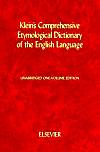May I have a word?
... Or several? Or just some really good etymologies? Reference books are a great passion of mine - I knew somehow that my husband was my basherter when he asked, the first time we met, if he could see my reference books. My standard favorite etymology was for many years the redoubtable Onions. Dr. Charles T. Onions devoted over 50 years of his life to the Oxford Dictionary of English Etymology and it's a great place to settle - or start - an argument.
Over the course of many years, I've given away several of these volumes to would-be "wordies", as I used to come across them cheaply enough in used bookstores. With some 38,000 words, it will scratch most linguistic itches. However, I began to feel that there were shortcomings - not enough space for non-Indo-European word origins, somewhat narrow scope, etc. My mind's eye began to wander, as it were.
Then, one wet and wintry day, my husband brought home the worn, red cloth volume that was to change our life in ways Mao's little red never could. It was Klein in name only. Klein's Comprehensive Etymological Dictionary the English language; Dealing with the Origin of Words and Their Sense Development thus Illustrating the History of Civilization and Culture. is a massive volume and undertaking, worthy of its chewy title and its high price tag (should you not get it as a gift, as did my lucky spouse).
Rabbi Ernest Klein, the author, was a linguist, author and rabbi. Born in 1899 in Szatmar, Hungary, his pre-World War II life was that of learning and prestige. He earned his doctorate at the University of Vienna and was chief Rabbi of Nové Zámky, Slovakia from 1931 - 1944. He was deported to Auschwitz in 1944 and returned to find that his father, wife and children had all perished. He served as Rabbi in Satmari, but he had no desire to remain in Romania. In fact, he had little desire for anything, as he was depressed almost to the point of despair.
His sister, Elizabeth, was gravely concerned about her brother's situation. She urged him to leave the blood-soaked soil of Eastern Europe and immigrate with her and her husband. They settled first in France and ultimately in Toronto, Canada, where he lived and served as the rabbi of Congregation Beth Yitshak until his death in 1983. Elizabeth was also the impetus for him to pursue his etymology. Rabbi Klein had been frustrated for many years over the inadequacies of most etymologies and was encouraged by his sister to write his own book. In the forward to his book, he expresses his hope that in finding the common roots of words and thereby of languages, that people will focus on that which brings us together and help to create peace among nations.

First published in 1966, Klein's work is nothing short of brilliant and truly deserves the name "comprehensive". His analysis extends to common first names, biblical and mythological characters, angels, saints and demons, and place names. He also examines thousands of medical, legal and scientific terms, as well as all roots and stems used to create compound English words. It is a staggering work of scholarship, yet accessible and often affable. It sits on a shelf beside our dining room table and it is a rare meal, especially with company, that we do not resort to it to look up an answer or detail. Beside it sits Klein's last work, published posthumously in 1987, his Comprehensive etymological dictionary of the Hebrew language for readers of English. But I'll leave that for another time.


2 Comments:
Glad you liked it, Jen. Tom and I are pretty obsessive about word origins - and love a good "pull out five volumes and see where we're at".
I use Klein all the time on my blog:
http://balashon.blogspot.com
I really would love to get my hands on a CEDEL...
Post a Comment
<< Home